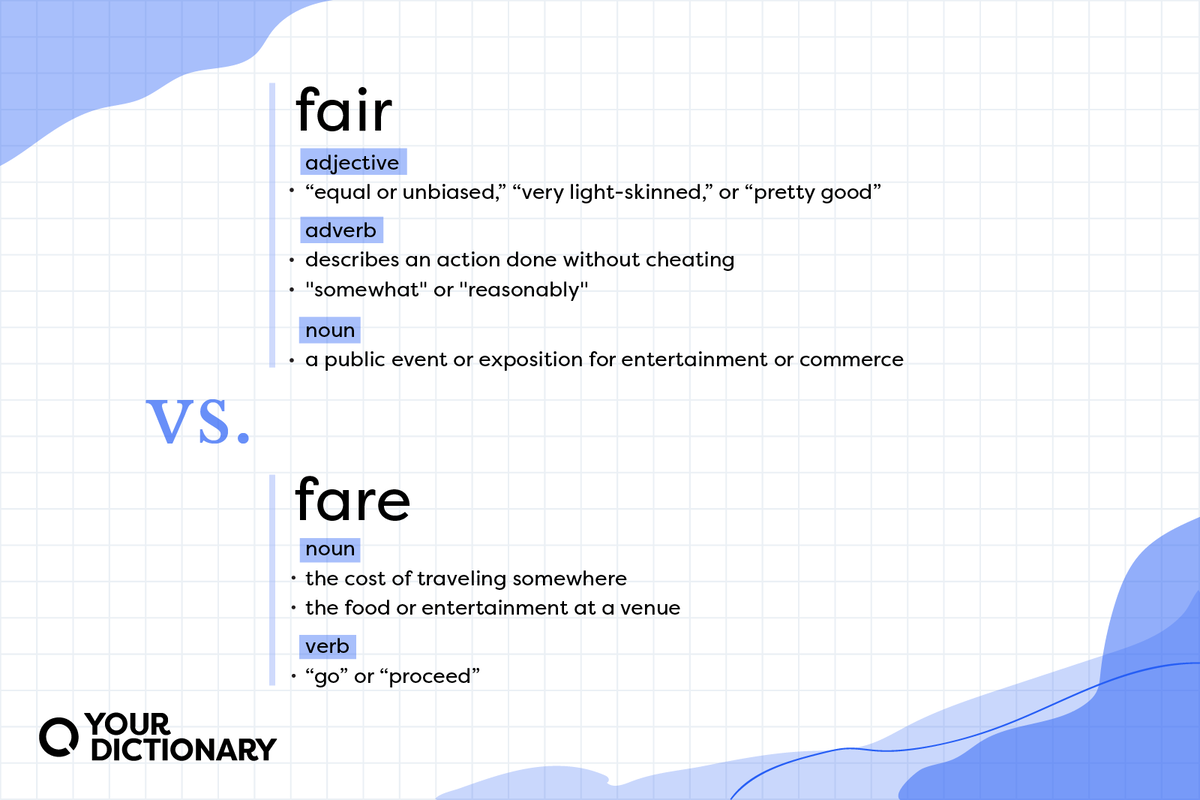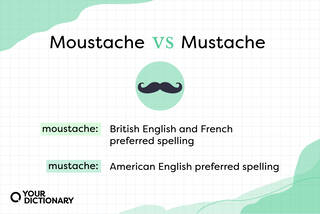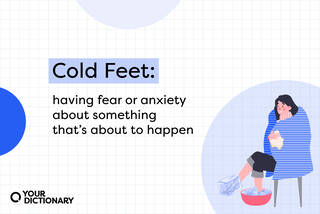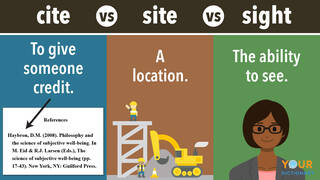
Does fair or fare mean "beautiful"? What about the money you pay to a bus driver — is that fair or fare?
Fair and fare are homophones, meaning that they sound similar but are spelled differently. They also have different definitions and uses in a sentence.
- Use fair as an adjective, adverb or noun.
- Use fare as a noun or a verb.
Even if you can't remember all the definitions of each word, remember this: only fare is a verb, and only fair is an adjective.
The Many Meanings of "Fair"
It's a fair bet that you use the word fair quite often in your everyday conversation.
But if you had to spell it, would you pick the right word each time?
How To Use "Fair" as an Adjective
If you're trying to decide between fair and fare to describe something, the answer is always fair.
While fair has many adjective meanings, fare has none. You can describe something as fair in the following ways:
- equal or unbiased - The referee's decision was fair for both teams.
- attractive - Sir Lancelot fell in love with fair Guinevere.
- pleasant, not cloudy - We planned a picnic to enjoy the fair weather.
- very light-skinned - My sister sunburns easily because she is so fair.
- pretty good - My textbooks are in fair condition after the semester.

Moustache vs. Mustache
How to Use "Fair" as an Adverb
When fair describes a verb, it's functioning as an adverb to describe an action done without cheating.
For verbs such as play or fight, you'd use fair, but with other verbs, you'd say fairly. For example:
- It's no fun to play with someone who doesn't play fair.
- In order to fight fair, you can't bring friends to help you.
- Shauna divided the cake fairly among the children.
Another use of fairly as an adverb is to mean "somewhat" or "reasonably" when modifying an adjective. For example:
- I'm fairly certain that he lives around here.
- At 5'9", she's fairly tall.
- The dogs get along fairly well.
How To Use "Fair" as a Noun
There's only one definition for fair as a noun: "a public event or exposition for entertainment or commerce."
You may see it spelled faire in this context, but that's the old-fashioned spelling for the same concept. Examples of fair in a sentence include:
- We rode the Ferris wheel and ate cotton candy at the state fair.
- Let's go to the job fair and see if any interesting employers are hiring.
- Have you ever bought fabric at a craft fair?
- I love dressing up and attending the Renaissance Faire every year.
- My favorite author will be signing her book at the Book Fair this summer.
Idioms that Use the Word "Fair"
Another popular way to use the word fair is in an idiom. Many English idioms and proverbs include the word fair, such as:
- all's fair in love and war - you can break the rules in cases of love and conflict
- fair and square - everything is equal for everyone involved
- fair game - acceptable to attack or criticize
- fair play - playing by the rules
- fair to middling - average, not great
- fair-weather friend - someone who is only a friend when things are good
- getting a fair shake - having a reasonable chance to succeed
- getting your fair share - receiving as much as everyone else has
- the fairer sex - an old-fashioned term to describe women
- turnabout is fair play - you can treat others the way they've treated you

Cold Feet: Meaning and History Behind the Idiom
What Does "Fare" Mean?
As you can see, there are many ways to use fair in a sentence. Fare is less versatile: You can use it in its noun and verb forms, but that's all.
Using "Fare" as a Noun
When you use fare as a noun, you're likely referring to the cost of traveling somewhere. For example:
- Bus fare just went up to $1.50.
- First-class is the most expensive type of airfare.
- Children only cost half fare at the train station.
Fare may also refer to the food or entertainment at a venue. For example:
- Burgers and fries are typical fast food fare.
- Let's sample the fare at the new Greek restaurant.
- The fare at the local theater features dancing, drama and lectures.
Using "Fare" as a Verb
The word fare is synonymous with go or proceed when used as a verb.
You may have heard the phrase "fare thee well," or "farewell," which means "go well." Other examples of fare as a verb include:
- How did the baseball team fare against last year's champions?
- I didn't study for the math test, but I fared okay anyway.
- Noah had hoped to fare better with his new boss, but it didn't go well.

Cite vs. Site vs. Sight: Making the Difference Clear